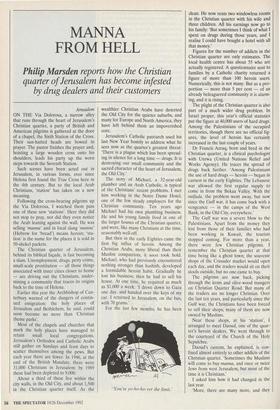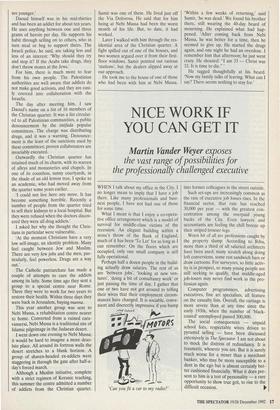MANNA FROM HELL
Philip Marsden reports how the Christian
quarter of Jerusalem has become infested by drug dealers and their customers
Jerusalem ON THE Via Dolorosa, a narrow alley that runs through the heart of Jerusalem's Christian quarter, a party of British and American pilgrims is gathered at the door of a chapel, the Sixth Station of the Cross. Their sun-hatted heads are bowed in prayer. The pastor finishes the prayer and, hoisting a large wooden cross onto his shoulders, leads his party up the worn steps towards the Seventh Station.
Such scenes have been acted out in Jerusalem, in various forms, ever since Helena first found the True Cross here in the 4th century. But to the local Arab Christians, 'station' has taken on a new meaning.
Following the cross-bearing pilgrims up the Via Dolorosa, I watched them pass one of these new 'stations'. Here they did not stop to pray, nor did they even notice the Arab leaning against the wall. He was selling 'manna' and in local slang 'manna' (Hebrew for 'bread') means heroin; 'sta- tion' is the name for the places it is sold in 50-shekel packets.
The Christian quarter of Jerusalem, behind its biblical façade, is fast becoming a slum. Unemployment, drugs, petty crime, small-scale prostitution — all those things associated with inner cities closer to home — are driving out the Christians, under- mining a community that traces its origins back to the time of Helena.
Earlier this year the Archbishop of Can- terbury warned of the dangers of contin- ued emigration: the holy places of Jerusalem and Bethlehem, he said, could soon become no more than 'Christian theme parks'.
Most of the chapels and churches that mark the holy places have managed to retain small local congregations. Jerusalem's Orthodox and Catholic Arabs still gather on Sundays and feast days to scatter themselves among the pews. But each year there are fewer. In 1946, at the end of the British Mandate, there were 31,000 Christians in Jerusalem; by 1989 these had been depleted to 9,000.
About a third of these live within the city walls, in the Old City, and about 1,500 in the Christian quarter itself. As the wealthier Christian Arabs have deserted the Old City for the quieter suburbs, and many for Europe and North America, they have left behind them an impoverished core.
Jerusalem's Catholic patriarch used his last New Year homily to address what he sees now as the quarter's greatest threat: 'There is a plague which has been spread- ing in silence for a long time — drugs. It is destroying our small community and the sacred character of the heart of Jerusalem, the Old City.'
The story of Michael, a 32-year-old plumber and an Arab Catholic, is typical of the Christians' recent problems. I met him working in the Notre Dame Hotel, one of the few steady employers for the Christian community. Ten years ago Michael had his own plumbing business. He and his young family lived in one of the larger houses of the Christian quarter, and were, like many Christians at the time, reasonably well-off.
But then in the early Eighties came the first big influx of heroin. Among the Christian Arabs, more liberal than their Muslim compatriots, it soon took hold. Michael, who had previously encountered nothing stronger than hashish, developed a formidable heroin habit. Gradually he lost his business; then he had to sell his house. At one time, he required as much as $1,000 a week: 'I drove down to Gaza one day, and handed over the keys of my car. I returned to Jerusalem, on the bus, with 70 grams.'
For the last few months, he has been 'You're yo-ho-ho-ver the limit.' clean. He now rents two windowless rooms in the Christian quarter with his wife and three children. All his earnings now go to his family: 'But sometimes I think of what I spent on drugs during those years, and I realise I could have bought a hotel with all that money.'
Figures for the number of addicts in the Christian quarter are only estimates. The local health centre has about 55 who are actually registered. A questionnaire sent to families by a Catholic charity returned a figure of more than 100 heroin users. Numerically, this is not many. But as a pro- portion — more than 5 per cent — of an already beleaguered community it is alarm- ing, and it is rising.
The plight of the Christian quarter is also part of a much wider drug problem. In Israel proper, this year's official statistics put the figure at 40,000 users of hard drugs. Among the Palestinians of the occupied territories, though there are no official fig- ures, the level of heroin has certainly increased in the last couple of years.
Dr Francis Azraq, born and bred in the Christian quarter, is a clinical psychologist with Unrwa (United Nations Relief and Works Agency). He traces the spread of drugs back further. 'Among Palestinians the use of hard drugs — heroin — began in earnest in the early Eighties. The Lebanese war allowed the first regular supply to come in from the Bekaa Valley. With the intifada, the problem went away, but now since the Gulf war, it has come back with a vengeance — in the camps of the West Bank, in the Old City, everywhere.'
The Gulf war was a severe blow to the Palestinians. Apart from the money they lost from those of their families who had been working in Kuwait, the tourists stopped coming. For more than a year, there were few Christian pilgrims. I remember the Christian quarter at that time being like a ghost town; the souvenir shops of the Crusader market would open each day, and the traders would sit on their stools outside, but no one came to buy.
The pilgrims are now back, picking through the icons and olive-wood mangers on Christian Quarter Road. But many of the traders are no longer Christian. Over the last ten years, and particularly since the Gulf war, the Christians have been forced to sell their shops; many of them are now owned by Muslims.
Near these shops, at his 'station', I arranged to meet Daoud, one of the quar- ter's heroin dealers. We went through to the courtyard of the Church of the Holy Sepulchre.
Daoud's custom, he explained, is con- fined almost entirely to other addicts of the Christian quarter. 'Sometimes the Muslims will come to buy manna, and once or twice Jews from west Jerusalem, but most of the time it is Christians.'
I asked him how it had changed in the last year.
'More, there are many more, and they are younger.'
Daoud himself was in his mid-thirties and has been an addict for about ten years. He uses anything between one and three grams of heroin per day. He supports his habit through selling on to others, who in turn steal or beg to support theirs. The Israeli police, he said, are taking less and less of an interest: 'Why should they try and stop it? If the Arabs take drugs, they don't throw stones at the Jews.'
For him, there is much more to fear from his own people. The Palestinian authorities are well aware that addicts do not make good activists, and they are easi- ly coerced into collaboration with the Israelis.
The day after meeting him, I saw Daoud's name on a list of 16 members of the Christian quarter. It was a list circulat- ed to all Palestinian communities, a public denouncement by the intifada popular committees. The charge was distributing drugs, and it was a warning. Denounce- ment is the least of the sanctions used by these committees; proven collaborators are invariably executed.
Outwardly the Christian quarter has retained much of its charm, with its warren of alleys and monasteries and chapels. In one of its countless, sunny courtyards, in the shade of an old lemon tree, I spoke to an academic, who had moved away from the quarter some years earlier.
'I could not live here any more. It has become something horrible. Recently a number of people from the quarter tried to sell their kidneys to a local hospital. But they were refused when the doctors discov- ered they were all drug addicts.'
I asked her why she thought the Chris- tians in particular were vulnerable.
'At the moment Christians have a very low self-image, an identity problem. Many feel caught between Jew and Muslim. There are very few jobs and the men, par- ticularly, feel powerless. Drugs are a way out.'
The Catholic patriarchate has made a couple of attempts to cure the addicts among its laity. Some time ago they sent a group to a special centre near Rome. There they were to work for two years to restore their health. Within three days they were back in Jerusalem, buying manna.
This year another group was sent to Nebi Mussa, a rehabilitation centre nearer to home. Converted from a ruined cara- vanserai, Nebi Mussa is a traditional site of Islamic pilgrimage in the Judaean desert.
I went down one evening to Nebi Mussa; it would be hard to imagine a more deso- late place. All around its fortress walls the desert stretches to a blank horizon. A group of shaven-headed ex-addicts were staggering in through the gate after half-a- day's forced march. Although a Muslim initiative, complete with a strict regimen of Koranic teaching, this summer the centre admitted a number of addicts from the Christian quarter. Samir was one of these. He lived just off the Via Dolorosa. He said that for him being at Nebi Mussa had been the worst month of his life. But, to date, it had worked.
Later I walked with him through the res- idential area of the Christian quarter. A fight spilled out of one of the houses, and two women argued over it from their first- floor windows. Samir pointed out various 'stations', but the dealers slipped away at our approach.
He took me to the house of one of those who had been with him at Nebi Mussa. 'Within a few weeks of returning,' said Samir, 'he was dead.' We found his brother there, still wearing the 40-day beard of mourning. He explained what had hap- pened. 'After coming back from Nebi Mussa, he was better for a time, then he seemed to give up. He started the drugs again, and one night he had an overdose. I remember him that afternoon; he just went crazy. He shouted: "I am 33 — Christ was 33. It is time to die." ' He tugged thoughtfully at his beard. 'Now my family talks of leaving. What can I say? There seems nothing to stay for.'











































































































 Previous page
Previous page